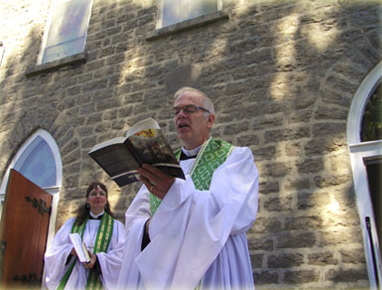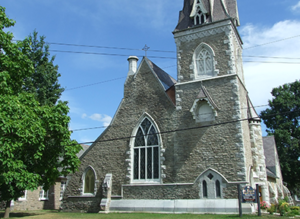A Sermon from Rev. Dr. David Smith
based on Romans 4.1-5, 13-17
In our New Testament reading, St. Paul talks about Abraham, the founding father of Israel. And Abraham is his great example of faith. Now the story of Abraham is a turning point in the Bible. Up till then, we heard the story of Adam and Eve, and how they no longer had a natural relationship with God. We heard the story of Cain and Abel, and how violence came into the world. We heard the story of Noah and the great judgement of the flood, and how God delivered Noah and those with him from that judgement. Finally we heard the story of the tower of Babel – how mankind attempted to make themselves great without God and how their purpose was frustrated.
In other words, the story up till now has been how humanity has become separated from God and how that has shown itself in arrogance and violence towards each other. How is God’s purpose for the world going to be realized? And that is when the Bible tells us about God calling Abraham. Humanity is going to be restored to its relationship to God through a man and his descendants. But the path towards this restoration is not going to be easy or straightforward. The restoration is going to mean that this man is going to have to leave his native country. The restoration is going to happen through the descendants of a couple who have no children. What God is going to do through Abraham is not going to seem very likely or even very possible.
And so, God’s restoration is going to have to be carried out by a man of faith, who can believe what God is doing, even though it does not seem likely. God promises a child to a couple past child-bearing age, And Abraham believes God. “Abraham believed God, and it was counted to him as righteousness.” God’s plan to restore humanity was going to be through the faith of Abraham.
Maybe you know some people who don’t think very much of faith as a guide for life. “I can’t take things on faith. That may be all right for some people. But I have to think things out for myself.” Well, what is faith? Is it something like this – to believe something because someone you trust has told you it? To trust something that you cannot know with certainty within yourself? If that is faith, then not only our religion, but the whole of life is based on faith.
I don’t know if you’ve ever been driving on the highway and it has occurred to you that you are hurtling along at 100 kilometres an hour and another car is rushing toward you at 100 kilometres an hour and you are perfectly relaxed. Why? Because you have faith in the two thin white lines painted in the middle of the highway.
You think back to your education, and about how little you were taught that you could know with certainty within yourself. There was a war in 1812. We learned this from other people. There is a country called China where they speak a language called Chinese. Reverend Tracey knows that from experience, but most of us don’t! Colds are caused by invisible things called viruses. Have you ever seen one? The earth goes round the sun and not the other way round. How would your education have gone if every time you were taught something, you had said, “Some people may be content to accept things on faith, but I can only accept what I know with certainty within myself.” Would the 10 year old who said that end up a genius, or just stubborn and ignorant?
What would our lives look like if we didn’t take things on faith? Have you ever seen one of those horror movies where nothing is the way it seems to be? The kindly old parents of your girlfriend turn out to belong to a cult that offers human sacrifices! The man you’re engaged to turns out to be 1000 years old and want to drink your blood! These movies can get to us because they draw on the fact that our understanding of everyone and everything around us is based on the faith that a “normal” interpretation of things is the right one. But that is faith – maybe things aren’t what they seem. And if you lacked that faith then you might end up a very strange and suspicious person. Or if it went further than that you might end up in the psychiatric ward with delusions.
Of course those movies are just imagination, but they show us something. Life depends on faith in other people – what they tell us about the world and what they show us about themselves. If faith is a bad guide to life, then we’re all in big trouble!
But maybe someone will say, “religious faith is different.” “We may not know any of those things without having faith in other people, but we could check them for ourselves if we had the time and the skill. But religious faith is about things that there is no way to check.” Maybe so. But why should that call into question the validity of religious faith? It could equally mean that in religious matters, we have to trust even more in what others tell us, and what religious writings tell us.
There is a remarkable story of the 20th century philosopher A.J. Ayer. His books are on the shelves in any university library. He was famous for being an atheist. And he dismissed the stories of people who had experiences of God. That wasn’t proof for him. Then he was very sick, close to death. And he had an experience of God. Then he recovered.
He was in an odd situation. He now believed in God, and he couldn’t go around disputing that anymore. But he couldn’t really proclaim God either, because his own experience still wasn’t proof to anyone else, as far as he was concerned. He believed it, but he didn’t think it was proof for someone else. He had an experience of God but he was still unsure about the role of faith.
For Christians of course faith is a key to everything, and Abraham shows us why. Abraham believed that God would give him descendants and that through them the world would be blessed. God said to him what could not be observed or proved, and Abraham believed it and held fast to it. That is how he became a part of God’s plan for the recovery of humanity and the recovery of his own life.
St. Paul says that Abraham believed in God, who “calls into existence the things that do not exist.” In other words, the things that God does that we know by faith are just as sure and solid as the created world. And the example of Abraham shows us how this is true. Because the descendants of Abraham are the Jewish people. Of all the peoples and all the religions that existed at the time of Abraham, none have had a history like the Jewish people. All the other religions of the time of Abraham are dead and the peoples have been assimilated into other nations. The Babylonians and their gods are gone. The Greeks and their gods no longer exist the way they did at that time. But the Jewish religion and the Jewish people still exist and there is no sign that they are going anywhere.
Can’t we take this to mean that the promise of God to Abraham,which seemed so unlikely at the time, has born fruit which we never would have expected? Not only that, but the two most prominent world religions, Christianity and Islam, have come to us directly through the descendants of Abraham. Doesn’t it seem that God’s promise to Abraham, which Abraham believed in faith, has actually come to pass?
Faith is the key to being a part of God’s plan to bring the world back to himself.
By faith we believe that that plan is as sure and as trustworthy as the creation. And the same faith shows us God at work in the events of our lives. Because we believe God’s big plan for the world – the one he first revealed to Abraham – we also believe the smaller plan that he has for our own lives. If we are looking for proof of the ways in which God is at work with us, we might have a hard time, because we know God’s working by faith, not by demonstrable proof. The things that sometimes happen to us when we need them, we believe to come from God because we have faith. Sometimes they might be close to being miracles, things that might make anyone wonder. Mostly they are just ordinary things that seem to have God’s signature on them, which we are disposed to believe because we believe that God does things that way, just as he did for Abraham.
Faith is the necessary basis for all natural life, and we believe that faith is the basis for all spiritual life as well. “Abraham believed God, and it was counted to him as righteousness.”
And so Abraham became the father of those who believe, and by believing take our place in God’s recovery of humanity to himself.




